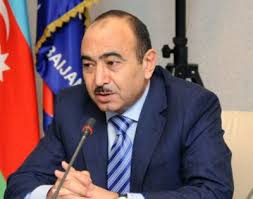
A roundtable discussion was held as part of the “Freedom of Expression and Freedom of the Media” project under Programmatic Co-operation Framework jointly implemented by the Council of Europe and European Union. At the roundtable, Azerbaijani President’s Aide on Sociopolitical Issues, Chief of the Presidential Administration’s Department of Sociopolitical Issues Ali Hasanov made a speech on freedom of opinion and speech. Ali Hasanov stated that ensuring freedom of opinion and speech and media freedom has always been at the heart of government attention, “Today, we can confidently say that Azerbaijan’s media landscape has already been fully formed.”
“Adopting defamation law at a time when insulting people in the press is widespread may cause a reverse effect. It’s necessary to take measures to improve professionalism of journalists. Some steps needed to be taken in order to prepare the public opinion for this innovation. The issue of adopting such a law in Azerbaijan has not been taken off the table. It still remains on the agenda. Real opportunities related to this draft law will be assessed in the future and international experience will be studied. It should also be taken into account that by removing relevant articles from the Criminal Code, ordinary citizens not related to journalism are also deprived of the opportunities to protect their rights, their honor and dignity. Besides, the same provisions still remain in the legislations of most European Union member states, including the leading states. If we are talking about non-application of these provisions in practice, similar situation exists in Azerbaijan as well,” Hasanov said.
Adoption of defamation law has been a topical issue since Azerbaijan’s accession to the Council of Europe (January 25, 2001). The recommended defamation bill was prepared with support by OSCE Baku Office in 2005, but did not find favor with the government. The government wants both to adopt the law and to keep the punitive Articles #147 and #148 in the Criminal Code, which is contradictory to the international standards. On December 27, 2011, Azerbaijani President approved the National Action Plan for Effective Protection of Human Rights and Fundamental Freedoms, which includes a provision on adopting defamation law. This, however, has only remained on paper. On June 4, 2013, President Ilham Aliyev signed the bill of amendments to the Criminal Code toughening the existing provisions, which was adopted by the Parliament on May 14. Defamation penalties are now applied to not only print and electronic media content, but also online content (internet speech). According to the new wording of Article 147 (libel), the sanctions are: a fine at an amount of 100 to 500 AZN or public work for 240 hours or corrective labor for 1 year or imprisonment for 6 months. Libel that involves accusing someone of serious crimes entails a 3-year jail sentence. According to the new wording of Article 148 (insulting honor and dignity), the stipulated punishment is a fine at an amount of 300 to 1000 AZN or public work for 240 hours or corrective labor for 1 year or imprisonment for 6 months.

